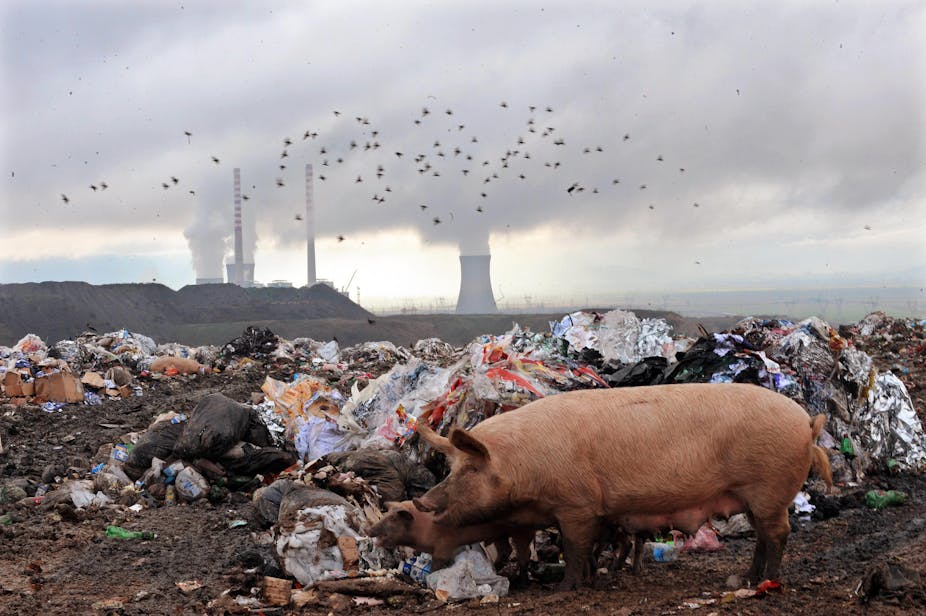The fifth edition of the Global Environmental Outlook (GEO-5) - a global environmental report card by the United Nations Environment Programme (UNEP) - reads like the results for a sedentary, middle-aged, overweight, binge drinking, heavy smoker. Low points of the report include:
evidence of climate change, including a 230% increase in flood disasters and 38% in drought disasters between the 1980s and 2000
threat of extinction of one-fifth of all vertebrates
-
collapse of some marine ecosystems due to pollution and overfishing, and the creation of 169 “coastal dead zones”.
Collectively, the prognosis of the GEO-5 report is dire, warning “if humanity does not urgently change its ways, several critical thresholds may be exceeded, beyond which abrupt and generally irreversible changes to the life-support functions of the planet could occur”.
These changes have profound implications for humanity. It is now certain that the future of the biosphere will be very different to what we have been acculturated to believe is “normal” or “natural”. We are yet to discover what it will be like, psycho-socially, to exist in an overpopulated and ecologically stressed world, where everyone knows the environment quality was substantially better for the previous generation.
Is it consistent with a civilisation on the brink of global environmental transformation that there should be a tiny investment in monitoring planetary health relative to, say, making blockbuster movies? The lack of data is a real problem for any accurate predictions of the future, particularly because we are unable to understand how the various components of the Earth system will interact. It is true that satellite imagery now provides excellent global, and in come cases daily, coverage of changes to the atmosphere, and land and sea surface. But there are critical aspects of the Earth system that remain poorly monitored, including assessments of trends (such as functioning of marine and terrestrial ecosystems) and the effects of pollution and invasive organisms.

The GEO-5 report acknowledged that the lack of good data makes it difficult to get an accurate picture of the state of the global environment. Problematically, the functioning of the earth system hinges on the interaction of numerous ecological components. Scientists have only a rudimentary understanding of these interrelationships. In some, cases trends may amplify each other; coral reefs, for example, are dying due to synergistic effects of global warming, overfishing and pollution.
The GEO-5 report provides some good news. Successes have included international treaties and agreements, phasing out ozone depleting chemicals and near-complete removal of lead in fuel. This shows humans will respond to immediate and clearly defined threats. There has been a steady expansion of declared national parks (even if funding for their management is insufficient) and increased efforts to slow the rate of deforestation.
Still, we are struggling to come to grips with more diffuse and intractable problems, such as climate change, water management, loss of biodiversity, human population growth and inequitable resource consumption. In these cases there is no simple remedy. Achieving global action has proven to be far more difficult. It needs poly-government policy development and enforcement, technological innovation and adoption. And while we’re working on these, the sheer complexity means we risk perverse outcomes, such as destroying Indonesia’s forests for “sustainable” biofuels.
The report says an “ambitious set of sustainability targets by the middle of the century is possible if current policies and strategies are changed and strengthened”. The question of who guards the global environmental guardians required to enforce these policies remains unresolved. But more fundamentally, achieving global environmental stewardship demands an iron political will at a global scale. And this, in turn, demands global constituency building. Until the global population cares enough, the political will to make changes won’t be there.

Effectively communicating to the global community the bad news about the trajectory of the Earth system presents a substantial problem. Doctors know that shouting at a patient with an unhealthy lifestyle does not change their behaviour.
Often the driver for urgently lifestyle change comes from a major health scare. Despite describing a trajectory of unprecedented global environmental changes, the GEO-5 report does not carry enough emotional freight to galvanise global action. And it is obvious that the recent litany of environmental disasters - Deepwater Horizon oil spill, Fukushima nuclear disaster, Black Saturday bushfires, Central America floods, French heat waves, Moscow forest fire smoke disaster and so on – have not prompted significant changes in human behaviour towards the Earth system. Part of the problem is that these disasters can be considered in isolation, framed against “natural” background risk, and thereby rationalised, blunting the clear signal that human civilisation is exposed to tremendous risk from both natural and anthropogenic extreme events.
The current state of the global environment is like a phony war. Nothing particularly bad has happened yet, despite protestation from environmental activists that something grave will happen soon. Nonetheless, the steady stream of data and reports, such as GEO-5, are all signalling that the future global environment will be seriously challenging – real war (literally and metaphorically) will eventually break out.
In the meantime, environmental scientists are caught in a bind – the public is numb to shock-and-awe predictions of global catastrophe. And in any case, scientific prognoses are constrained by the overwhelming complexity of the Earth system, which is poorly understood or monitored. There remains little serious science investment compared to the funding for the discovery of fundamental physical phenomena at the quantum or astronomical scales.
Beyond the certainty of dramatic global environmental changes, the only certainty is uncertainty. I suspect that most people have accepted that the environment will be dramatically transformed in their, and certainly their kids, lifetimes. But they are either in serious denial or hoping for the best. It seems collectively humans only demand drastic political change when confronted by overwhelmingly compelling and immediate threats. And as the Arab Spring has taught us, revolutionary moments are not always ordered or peaceful. It is a brave new world indeed.

